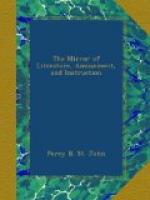of Cumberland, embittered the conclusion of his life,
by embarking in a series of adventures, which, in
spite of their profligacy, or rather in consequence
of it, possess a very strong romantic interest.
Finding that his father was either unwilling or unable
to furnish him with funds to maintain his inordinate
riot and luxury, he became the leader of a band of
outlaws, and, by their agency, levied aids and benevolences
upon the different travellers on the king’s
highway. A letter of the old lord, his father,
which, by the by, is not the letter of an illiterate
man, is still extant, in which he complains in very
moving terms of his son’s degeneracy and misconduct.
The young scapegrace, wishing to make his father know
from experience the inconvenience of being scantily
supplied with money, enjoined his tenantry in Craven
not to pay their rents, and beat one of them, Henry
Popely, who ventured to disobey him, so severely with
his own hand, that he lay for a long time in peril
of death. He spoiled his father’s houses,
&c. “feloniously took away his proper goods,”
as the old lord quaintly observes, “apparelling
himself and his horse, all the time, in cloth of gold
and goldsmith’s work, more like a duke than a
poor baron’s son.” He likewise took
a particular aversion to the religious orders, “shamefully
beating their tenants and servants, in such wise as
some whole towns were fain to keep the churches both
night and day, and durst not come at their own houses.”—Whilst
engaged in these ignoble practices, less dissonant,
however, to the manners of his age than to those of
our’s, he wooed, and won, and married, a daughter
of the Percy of Northumberland; and it is conjectured,
upon very plausible grounds, that his courtship and
marriage with a lady of the highest rank under such
disadvantages on his part, gave rise to the beautiful
old ballad of the Nutbrown Maid. The lady, becoming
very unexpectedly the heiress of her family, added
to the inheritance of the Cliffords the extensive
fee which the Percies held in Yorkshire; and by that
transfer of property, and by the grant of Bolton Abbey,
which he obtained from Henry the Eighth, on the dissolution
of the monasteries, her husband became possessor of
nearly all the district which stretches between the
castles of Skipton on the south, and of Brougham,
or as the Cliffords, to whom it belonged, always wrote
it, Bromeham, on the north. The second Earl of
Cumberland, who was as fond of alchemy and astrology
as his grandfather, was succeeded by his son George,
who distinguished himself abroad by the daring intrepidity
with which he conducted several buccaneering expeditions
in the West Indies against the Spaniards, and at home,
by the very extensive scale on which he propagated
his own and his Maker’s image in the dales of
Craven. Among the numerous children of whom he
was the father, the most celebrated was the Countess
of Pembroke and Montgomery, whose long life of virtuous
exertion renders her well qualified to figure as the




